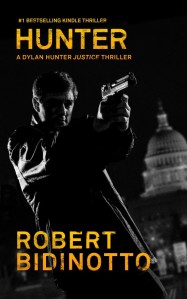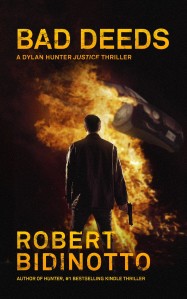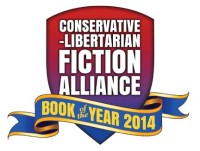Photos by Brian Killigrew
Lee Child is the bestselling author of what Publisher’s Weekly calls “arguably today’s finest thriller series.” Its huge, and hugely popular, protagonist—a giant, incorruptible drifter named Jack Reacher—has been dubbed “the thinking reader’s action hero.” A former U.S. military policeman, Reacher is a modern knight errant—an indomitable force for the good in a morally blighted world. And his creator is an eloquent, unapologetic champion for the same ideals.
Born in England in 1954—real name James Grant—Lee grew up on the tough streets of Birmingham. He took his childhood love of fiction into a 20–year career as a presentation director for Granada Television. But when industry downsizing led to a major layoff, his career came to an abrupt halt in 1995.
At age 40—facing joblessness, broke, with a family to feed, yet supremely confident—Child did the unthinkable. Rather than seek a new job, he sat down to write a novel in longhand. The result was a gripping thriller, Killing Floor, that won awards, rave reviews, and the first of millions of avid fans who now call themselves “Reacher Creatures.”
Fifteen novels have followed, most with terse, edgy titles: Die Trying, Tripwire, Running Blind, Echo Burning, Without Fail, Persuader, The Enemy, One Shot, The Hard Way, Bad Luck and Trouble, Nothing to Lose, Gone Tomorrow, 61 Hours, Worth Dying For, and, just released this fall, The Affair—yet another #1 New York Times bestseller. Meanwhile, One Shot is headed to the big screen, the first in what the author hopes will become a successful Jack Reacher film franchise.
Child now lives the good life with his wife in Manhattan and in the south of France. Between novels, he reads, smokes, drinks coffee, listens to music, and watches the Yankees—all addictively. Tall, slim, with sky-blue eyes and a keen intellect, he clearly has exported much of himself into the Reacher character.
On May 1, 2007, Lee Child sat down with me and photographer Brian Killigrew at Partners & Crime Mystery Booksellers in New York City, and later at Da Umberto Restaurant, for a wide-ranging, captivating, and inspiring interview. It was first published in the July/August 2007 issue of The New Individualist, a magazine that I edited at the time. It’s reprinted here with the permission of the magazine and its publisher, The Atlas Society.
Thanks to Lee and to his publicist, Maggie Griffin–who is also proprietor of Partners & Crime Mystery Booksellers–for their generous gifts of time, space, and captivating conversation.
(Note: If you click on the photos, you may get an expanded view of them on your browser.)
~*~
“For a so-called noir or hard-boiled writer, my books aren’t really very gray. There are good guys and bad guys, and the good guys win—count on it.”
—Lee Child
The Vigilante Author: I love a quotation from one of your previous interviews about how in your books, the good guys always win.
Lee Child: Well, that quotation was referring partly to the genre descriptions that we’re all saddled with. The retail trade is always keen on specifying exactly what kind of book it is. Is it a mystery, is it suspense, is it crime fiction, is it hard-boiled, is it noir? Most of those genres involve a certain amount of grayness. Typically, hard-boiled fiction is about bad things happening to bad people. Crime fiction is about the effect of a crime on a family or a community.
I’m not really into that at all. My books are straightforward, old-fashioned adventures where there is a clear-cut, binary choice: You are either with the hero or against him, and that determines your fate. And Jack Reacher will never lose, and he will never be gray in any way.
The Vigilante Author: Does that grow out of something in you? People would not want to hear that it grows out of any kind of marketplace calculation. But I’m curious.
Child: I think it’s a universal truth that, for all writers, it grows out of what they’ve read. I have a particular impatience with bandwagon-jumping. At the time that I was starting out, we were going through a long period where, maybe fifteen years before, people had started experimenting with “the flawed hero.” It had just gotten totally out of hand. Heroes were becoming more and more miserable—flawed, dysfunctional, dragging themselves miserably from page to page.
I’m a contrarian and a skeptic, and as soon as I saw everybody doing that, I thought that I wanted to do something much more pure and old-fashioned. When people say old-fashioned, they tend to think it means from the ’50s or the ’30s eras. But I’m talking about stuff from the Middle Ages and way back farther than that. These are universal paradigms of human myths.
A HERO WITH NO “BAGGAGE”
The Vigilante Author: Talk about this character, Jack Reacher.
Child: Well, he’s an ex-military policeman, and he was demobilized in his middle thirties after having served all of his adult life in the [U.S.] Army and having grown up on Marine bases, because his father was a Marine. The idea was to have a character that was plausibly rootless. Most people who are wanderers do it for other reasons—they are mentally ill, or something like that. Reacher is completely competent, but he’s just habituated to this fragmented life in the military, so he can’t settle into civilian society. The idea of staying anywhere for more than a few days is anathema to him.
The Vigilante Author:It’s a reaction.
Child: Yes. So he lives frugally, doesn’t participate in the consumer society, is bemused by most things. He just travels from place to place pursuing his own interests, which are largely introspective, and keeping himself to himself.
The Vigilante Author: In these travels, he falls into all of these adventures. He doesn’t seek them out; circumstances just seem to thrust him into situations where his involvement becomes irresistible. And it’s always a matter of honor, or some injustice, that pulls him in. Why this strong sense of rebellion against injustice?
Child: I don’t know why. But some people—and I think I’m one of them—you see something developing, and you cannot stay away. You’ve got to react; you can’t just pass by on the other side of the street. And he’s like that.
People have said that it’s unrealistic that he constantly runs into so much trouble. And I’ve said, “Well, not really. I write perhaps only one week out of his year. If I write the other fifty-one books where nothing happens for four hundred pages, publishers won’t publish it.”
The Vigilante Author: Jack Reacher doesn’t come with any baggage.
Child: Right. He literally comes with no baggage—
The Vigilante Author: That’s what I meant.
Child: —which is a metaphor for the fact that he comes with no emotional baggage, either. Which takes me back to what I said before—about trying to get away from these damaged heroes.
The Vigilante Author: What do you think is Jack Reacher’s core appeal? What do you think people see in the character?
Child: I think it comes down to wish fulfillment, pure and simple. I mean, anecdotally, all I really go on is what people tell me. I’ve had so many guys say to me—and these are normal guys, and they’ve probably been working all day in the bank or on Wall Street or wherever—and they come to a book signing and they look a little bit plaintive. They say, “Boy, I wish that I could live like Jack Reacher lives.” Because we all reach a point where we’re burdened down with responsibilities and chores and errands and bureaucracy, and wouldn’t it be great just to get rid of it all and walk off into the sunset? So for the guys, it’s a lot of wish fulfillment.
And for the women, I think it’s the same thing, wish fulfillment—but the other way around. They wish that he would walk up their path and knock on their door, specifically because he won’t stay very long.
A couple of years ago, I was on tour and stopped in Scottsdale, Arizona, on a Saturday afternoon. I was unsure how many people we would get, because it was like 120 degrees. It ended up the store was absolutely full—120 people, standing room only—and all of them were women. So, instead of doing the regular event, I just said, “Look, I cannot help but notice that you are all women. So, I want to know, why are you here?” It turned into a kind of massive book-club discussion about the appeal of Reacher to women.
They came out with four specific conclusions. One was that women, even now in the twenty-first century, find it difficult to express anger. An angry man is seen as assertive, and an angry woman is seen as shrill. So, they are perpetually conflicted about anger, and they love to read about it on the page, vicariously—they want to see somebody kick somebody else’s butt, because they actually can’t do it themselves.
Point number two was that Reacher responds in an almost feminine way to injustice. I’ve noticed that if you ever hear somebody bang the table in exasperation and say, “It’s just not fair,” it will always be a woman. Men are much more ready to accommodate the gray areas—I don’t know why. But women are capable of getting upset about injustice, and Reacher does the same thing. If Reacher sees something that’s unfair, he doesn’t accommodate it; he reacts to it. And, by the end of the book, it is fair—big time—and he’s made it fair. I think that women love that story arc.
The third reason they gave is that Reacher likes strong, realistic women, and he treats women with respect. Reacher is a post-feminist. He doesn’t cut them any slack, but also he has no negative preconceptions. If you’re a woman, he will be your friend; but if necessary, he will kill you. He doesn’t make any gender distinctions.
And the fourth reason they gave is that he was hot. I think this is something universal. We all want a little bit of variety and adventure. I think everybody, however up-tight you are, is somewhat open to the idea of having a love affair. We don’t, because having love affairs is generally very, very messy. Everything falls apart; you lose your house, you lose the kids, you get divorced; it’s all a mess. So we don’t do it.
But in theory, suppose we could do it with absolutely no comeback? That’s what Reacher offers. Reacher will be an intensely fun companion for three or four days, and then he will be gone, and you will never, ever see him again. You can absolutely guarantee that. He won’t write; he won’t call; you will never see him again.
The Vigilante Author: You couldn’t reach him if you tried.
Child: Right. He’s in your life and then out of your life, and that’s a very reassuring fantasy.
“AN ARROGANT GUY”
The Vigilante Author: Reacher’s code of justice hearkens back, mythically, to the “knight errant” character. How might that have shaped your thinking?
Child: It was a paradigm that I was always attracted to reading about. And not surprisingly, because if a character has survived three thousand years of human story-telling, it’s got to be a good character—it’s market-tested already. That’s just a very attractive paradigm: The knight errant who shows up in time to save the day.
The code-of-justice thing—that’s existed for a very long time. Recently, it’s been somewhat corrupted, because we’re now into this relativistic thing, where out of some kind of liberal obligation we have to say, “A is as good as B—it’s just different; C is just as good as D.” But nobody’s allowed to make a positive choice anymore.
I’m as liberal as they come, but I also don’t like relativism. At some point you have to be able to say: “I’m sorry, but A is better than B.” Or: “I’m sorry, but C is worse than D.” No argument. I’m impatient with having to say that everything is as good as everything else. And Reacher’s the same. He looks at a situation, and he will say, “This is right, and this is wrong.”
The Vigilante Author: And he’s adamantine in his sense of self—his security in his values.
Child: Yeah, absolutely. He’s not in the least bit insecure. He’s way beyond examining his navel and worrying about himself. In many ways, he’s arrogant. That’s another valuable lesson that I learned from reading, which is that it’s a fatal mistake to start to like your character too much. So he’s an arrogant guy. I mean, it’s arrogant to walk into a situation and say, “I will decide what is right and what is wrong—I will be judge, jury, and executioner.”
And really, every book—if you analyze it carefully—is a contest between Reacher’s arrogance and the bad guy’s arrogance, because he responds particularly to the idea of some shadowy figure in the background who thinks he can get away with something, thinks he can put one over. Reacher’s basic response is to say, “Well, we’ll see about that.” So then it becomes a contest for supremacy.
Arrogance is not an attractive characteristic; but if you start to leach out all of the negative things about a character, you end up with this sugary confection, and the reader’s going to get diabetes just by reading it.
The Vigilante Author: But there’s a supreme self-confidence about Reacher that I think is very attractive in a postmodern world where you have relativistic values—where people aren’t sure; where they say, “What’s ‘right’ for you is not necessarily ‘right’ for me.” This man’s iron certainty, I think, is tremendously appealing to people: It’s an anchor in a rudderless world.
 Child: It is. People are either frustrated because they can’t make up their mind all day, or frustrated that they have to conceal their true judgment. That’s the entire focus of fiction: to give people what they can’t get out of their real life. That’s absolutely what fiction is for.
Child: It is. People are either frustrated because they can’t make up their mind all day, or frustrated that they have to conceal their true judgment. That’s the entire focus of fiction: to give people what they can’t get out of their real life. That’s absolutely what fiction is for.
You see that all of the time in any romantic thread in a novel. I go somewhere on the subway, and I see some pretty girl sitting opposite me. The reality is that I’m not going to take her to dinner; I’m not going to sleep with her that night; we’re not going to live happily ever after on a desert island. I’m not even going to talk to her—because if you start talking to somebody on the subway, you’ll probably get arrested. So the reality is frustration.
So, you read a book where you do talk to her, you do start a relationship. Fiction gives you what you don’t get. It’s the same thing with Reacher. People’s real lives, they’re not certain; they’re constantly stymied and frustrated; so they love to watch Reacher being certain and getting his own way.
“I DON’T CARE WHAT A CRITIC SAYS”
The Vigilante Author: You said once that, as a writer, you’re not in this for validation and approval. I get the same sense out of Reacher, as a character.
Child: Yeah. I just read a very interesting book by David Mamet called Bambi versus Godzilla. It’s his ramblings about the screenwriting business. Mamet said the basic transaction in a story is this: The main character appears and says, “Hi, I’m the main character.” And the audience then says, “Are we going to like you?” What happens next becomes crucial. The worst possible choice is for the main character to say, “Yeah, you’re really gonna love me, and I’ll tell you why!” Instead, the best screenplays and actors say, “Are you gonna like me? You know—I don’t care. Like me or not, it makes no difference to me.”
That’s how to be confident and attractive on the screen, and it’s the same thing in a book. The audience asks Reacher, “Are we gonna like you?”—and Reacher says, “You might; you might not; and either way is fine with me.”
The Vigilante Author: He’s extraordinarily independent, a real individualist. He thinks for himself and faces reality without seeing it through the eyeballs of anyone else. He has a direct relationship with facts and lets chips fall where they may.
Child: Yes, he’s very fact-driven, reality-driven, rational. And so am I, which is why it’s absolutely not rational to look for validation from critics or insiders in the business. That’s another fatal mistake. You can sometimes tell people are writing to impress their friends or some kind of inner circle. That’s stupid. Your friends—how many are they? They’re going to buy, like, six books. What you need is to impress the audience out there.
 So I don’t care what a critic says. Critics can say whatever they like, it makes no difference to me. It also doesn’t tell me anything. I’ve lived with the book for a year; I know whether it’s good or bad; I know where it’s weak or strong; I don’t need somebody else to tell me. So, it’s a matter of total indifference to me what anybody says. It sounds very cynical, but all that I care about is: How many copies does the book sell? And not because I’m greedy for the money, but because that’s the only true measure: Are real people actually reading this book?
So I don’t care what a critic says. Critics can say whatever they like, it makes no difference to me. It also doesn’t tell me anything. I’ve lived with the book for a year; I know whether it’s good or bad; I know where it’s weak or strong; I don’t need somebody else to tell me. So, it’s a matter of total indifference to me what anybody says. It sounds very cynical, but all that I care about is: How many copies does the book sell? And not because I’m greedy for the money, but because that’s the only true measure: Are real people actually reading this book?
The Vigilante Author: A measure of what?
Child: A measure of success. We’re here to entertain the audience. The audience comes first, second, and third. If you ever lose sight of that, you are sunk.
The Vigilante Author: That’s your sense of responsibility as a writer?
Child: Yeah, absolutely. I learned that in television: that nothing matters except the audience. That’s the only true reward—sell a few more books than last year. It means everybody liked it enough to come back and get a copy, and it also means that they’ll tell their friends about it.
CHILDHOOD IN “A ROUGH, TOUGH PLACE”
The Vigilante Author: We’ve talked about Jack Reacher. Talk about Lee Child.
Child: For me, really, the important parts are growing up in Birmingham, England. It’s entirely a manufacturing city. There’s no heavy industry—they don’t make steel there, it’s all metal bashing. There are no thatched cottages, no thousand-year-old buildings. So it has a very un-English feel. It was about people making useful things, and there was no point in anything if it wasn’t useful. It was all pragmatic, artisan stuff. That’s what I loved about that place. It was completely unpretentious—just get the job done, no fuss, no drama, in a really workmanlike fashion. That’s all I’ve ever wanted to be—a workman in that old-fashioned sense.
The Vigilante Author: You’ve described your childhood there quite colorfully.
Child: It was a rough, tough place. There was no solution to anything except instinctive violence. Whatever your dispute with another guy was, it would be settled by violence. We didn’t have guns or anything like that, but we had knives, and we had bicycle chains, and all that kind of stuff.
But to me, it was not all that rough, because by some genetic accident, I was enormous—I was huge as a kid. I really have not grown very much since I was ten or eleven; I was a giant, a freak. And in a sense, that’s where Reacher comes from, because I was, as a kid, physically unchallengeable. I try to give that same feeling to Reacher.
The Vigilante Author: Physically, he’s like a human wrecking ball.
Child: Yes he is.
The Vigilante Author: He’s a very intelligent guy—the wheels are always turning, so there’s a lot more to him than just the brute force—but he’s a force of nature.
Child: Yes, because the brute force is there if he needs it. I wanted to convey the feeling that this is a guy who can turn any corner anywhere in the world, and whatever lies in front of him, it would be an amazing coincidence to come across anybody as tough as him, or tougher. He breezes through life pretty much certain that he’ll never be physically vulnerable.
We all walk down the street and we’re all worried, in some way or another—worried, scared, humiliated. We get used to that feeling. It’s really nice when you hear about a guy who isn’t. And that was me at the age of nine. I was this big [raises his hand overhead], and everybody else was, like, this big [lowers it below shoulders]. So, although it was a rough place, I was hardly ever the victim.
One time my great-aunt was visiting from London and I was supposed to meet her and my mother at the local library. To get to the library, you had to go up some steps and then through this alley. And waiting in the alley were five tough guys who had a beef with me. I can remember walking in this alley and thinking, “Damn. I’m going to be late to the library.” That was my only concern: I was going to be late now, because I have to take out these five guys. And my next thought was: “Well, let’s do it as fast and as efficiently as possible.” So, it was just like mayhem for two or three minutes, and then I carried on.
~*~
In Part 2 of this interview: Lee Child reveals his early literary influences; his two-decade career as a television director; the mid-life career crisis that led him to make the daring leap to fiction–and the genesis of his iconic hero, Jack Reacher.
Check it out…and be sure to visit Lee Child’s website.






 Photo (c) by Debbie Scott
Photo (c) by Debbie Scott




